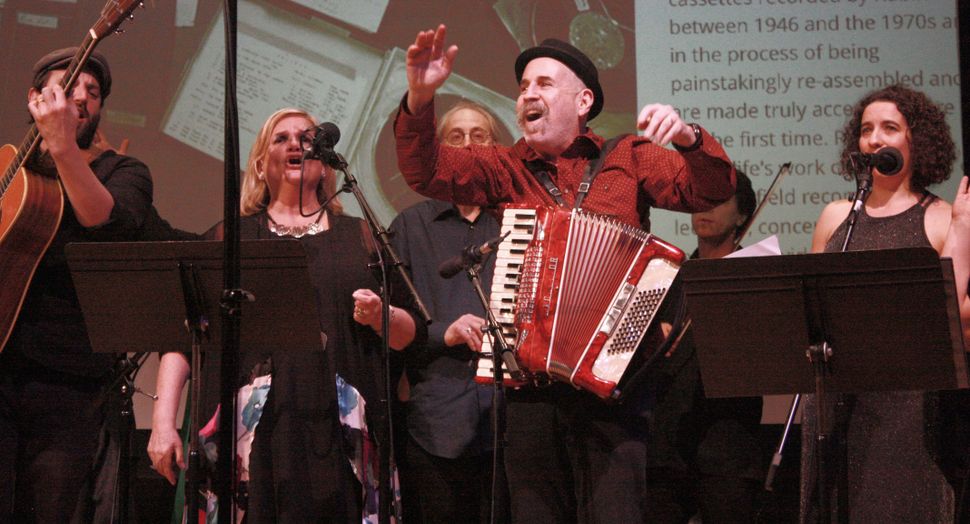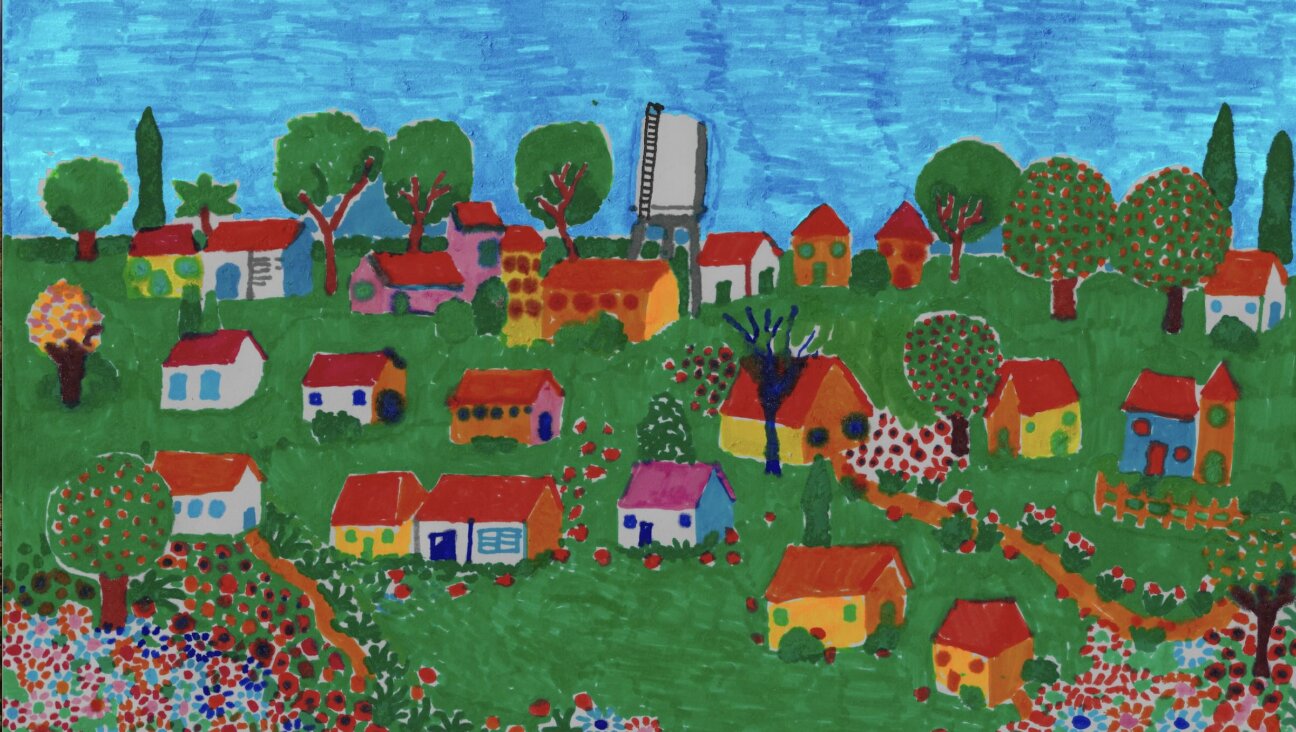In Praise Of Ruth Rubin, Patron Saint Of Yiddish Song

Ruth Rubin tribute concert Image by Seth Rogovoy
Ruth Rubin was the Alan Lomax of Yiddish folk song. For over 40 years, she visited Jewish communities around the world, tape recorder in hand, assembling a collection of more than 2,000 songs, including lullabies, children’s songs, love songs, drinking songs, satirical songs, and work songs, gathered from ordinary (and some extraordinary) “informants.” Hers was a Herculean effort, done entirely at her own expense out of a fervent desire to save a culture threatened by assimilation.
Rubin’s monumental efforts were celebrated at the YIVO Institute at the Center for Jewish History on Sunday December 23 in a concert that featured an all-star cast of Yiddish musical talent performing songs from Rubin’s vast archive. The event was curated by Lorin Sklamberg, YIVO’s Sound Archivist, perhaps best known as confounder and lead vocalist of the Grammy Award-winning Yiddish outfit, the Klezmatics. Sklamberg was joined by over a dozen other musical talents prominent on the contemporary Yiddish scene, including Daniel Kahn, Joanne Borts, Sarah Mina Gordon, Ethel Raim, Eleonore Biezunski, Josh Waletzky, Polina Shepherd, Efim Chorny, and Michael Alpert. Also on hand to offer tributes to and readings by Rubin were her nephew, Simon Spivack, documentary filmmaker Cindy Rivka Marshall, renowned Yiddishist Itzik Gottesman (former managing editor of the Yiddish Forverts), and ethnomusicologist Mark Slobin.
A portrait of Rubin emerged over the course of the evening of a vibrant, playful, joyous field researcher who loved nothing more than discovering new songs or variations of old songs that opened windows into the Jewish life cycle of the Old World and sharing her findings with others. The talent on hand and the remarkable songs that were offered served loudly and clearly as testaments to Rubin’s impact on Yiddish music as we think of it and experience it to this day.
For Rubin, it was always about the songs, and on this night featuring multiple marquee performers, world-renowned artists humbly set aside their own particular musical agendas in the service of those songs. Michael Alpert, a towering figure of the klezmer revival and renaissance as cofounder of Kapelye and Brave Old World, channeled the sound of a 19th century folksinger in “Papir Iz Zikh Vays (As Paper Is White),” employing the unique vocal ornaments of the Ashkenazi cantor – the bent, achy, twisted notes that simultaneously express joy and sorrow in a manner that bypasses the brain and goes directly to a listener’s heart.
Accompanied by violinist Jake Shulman-Ment, Daniel Kahn offered “Fun Groys Dasad Leyg Ikh Zikh Shlofn (In Great Sorrow I Lay Me Down),” a number Rubin discovered in 1955 in Montreal, perhaps accounting for the vague hint of Leonard Cohen in the melody and overall vibe. Sarah Mina Gordon was joined by a chorus of female singers for a boisterous “Ikh Hob Nisht Keyn Shande (I’m Not Ashamed),” a comic song about a family of thieves first sung to Rubin in New York in 1955.
Joanne Borts sang “Eyder Ikh Leyg Mikh Shlofn (No Sooner Do I Lie Down to Sleep)” with great drama; Ethel Raim lent the mournful “Shtey Ikh Mir Ba Mayn Tatn Oyf Der Tir (I’m Standing at the Threshold of My Father’s Door)” a quiet dignity; and Jeff Warschauer tagged “Hob Ikh Mir a Shpan (I Have a Coach)” with a comic cantorial approach that recalled Moyshe Oysher. A vintage field recording of Mark Slobin’s father singing an ethnic fusion song called “O’Brien” nearly stole the show.
One moment towards the end of the concert —— cosponsored by Yiddish New York and the Center for Traditional Music and Dance — stood out as the very picture of Yiddish revival and cultural transmission. Eleonore Biezunski was accompanied on “Meydelekh Un Vaybelekh (Girls and Wives)” by a trio of violinists representing three generations: Michael Alpert, Deborah Strauss, and Jake Shulman-Ment. That in itself spoke volumes about the successful rescue mission waged by Rubin and her ilk.
Speaking of Michael Alpert, the trailblazing Yiddish revivalist and renaissance man headlined his own program immediately following the Ruth Rubin tribute. His “Crossing the Border” concert showcased Alpert’s original work in Yiddish as well as paying tribute to a diverse cross-section of his influences. Alpert read Lewis Carroll’s “Jabberwocky” in Yiddish translation; he sang a capella love songs from Western Ukraine; and offered an original Yiddish song about the delights of herring. A few of his original compositions, including his autobiographical English-language tune, “My Father Was a Simple Man,” betrayed the influence of Sixties folk artists including Paul Simon (with Art Garfunkel when Daniel Kahn provided vocal harmonies), Tom Paxton, and the like. The program took its title from the Si Kahn (no relation) song of the same name, about Kahn’s immigrant father, a lovely counterpart to Alpert’s own tune about his dad. Alpert also offered a few fiddle tunes in an instrumental jam with ace tsimblist Pete Rushefsky. It was great to have Alpert, who left New York City for Scotland a number of years ago, back in the thick of it.
Concerts, classes, lectures, and workshops continue all week as part of the Yiddish New York festival.
Seth Rogovoy is a contributing editor at the Forward.
A message from our Publisher & CEO Rachel Fishman Feddersen

I hope you appreciated this article. Before you go, I’d like to ask you to please support the Forward’s award-winning, nonprofit journalism during this critical time.
We’ve set a goal to raise $260,000 by December 31. That’s an ambitious goal, but one that will give us the resources we need to invest in the high quality news, opinion, analysis and cultural coverage that isn’t available anywhere else.
If you feel inspired to make an impact, now is the time to give something back. Join us as a member at your most generous level.
— Rachel Fishman Feddersen, Publisher and CEO























